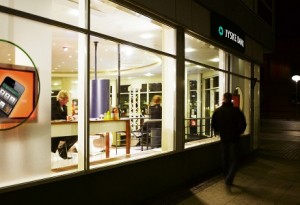Jyske Bank builds in Sweden with SEK1bn Tier 2 return
May 13th, 2016
Denmark’s Jyske Bank sold its first subordinated debt transaction in 10 years yesterday (Thursday), a SEK1bn (€108m, DKK801m) 10NC5 Tier 2 issue, opting for the Swedish krona market because of the flexibility it offers, according to the group’s head of debt IR and capital markets funding.
 Jyske leads Danske and SEB priced the 10 year non-call five Tier 2 issue, split into floating and fixed rate tranches, at 300bp over three month Stibor and mid-swaps, respectively – in the middle of guidance. The floating rate note was ultimately sized at SEK600m and the fixed rate tranche at SEK400m. The book closed at SEK1.15bn, comprising 25 accounts.
Jyske leads Danske and SEB priced the 10 year non-call five Tier 2 issue, split into floating and fixed rate tranches, at 300bp over three month Stibor and mid-swaps, respectively – in the middle of guidance. The floating rate note was ultimately sized at SEK600m and the fixed rate tranche at SEK400m. The book closed at SEK1.15bn, comprising 25 accounts.
“All in all, this is the perfect deal,” said Merete Poller Novak, head of debt IR and capital markets funding at the Jyske Bank Group treasury. “We are happy with the price, and investors, too – getting a nice pick-up on the fourth largest Danish financial institution and a Danish SIFI bank, versus smaller Swedish domestic issuers.
“What’s not to like here – from both perspectives?”
Bankers noted that Jyske’s new issue offered a pick-up of around 75bp over comparable Swedish paper. Syndicate officials away from the deal cited a SEK1.5bn 10NC5 Tier 2 issue for LF Bank sold at the end of April, which was quoted at around 225bp over three month Stibor, mid.
“Non-domestic issuers typically have to pay a bit of a premium in the Swedish market,” said one. “Swedish investors like the domestic names, especially the ones who do not issue in the euro market.”
He noted that this preference for domestic paper was also reflected in the books of recent deals, with LF’s Tier 2 issue having drawn orders of SEK2.5bn for a SEK1.5bn deal
Novak added that the pricing of Jyske’s deal looked attractive versus the levels on offer in the euro market.
Jyske Bank said the issue is part of the gradual adjustment of its capital structure to an announced objective of a Common Equity Tier 1 capital ratio of 14% and a capital ratio of 17.5%. These ratios were at 15.9% and 16.7%, respectively, as of the end of the first quarter, although Novak added that all capital adjustments are subject to Jyske maintaining the group’s S&P RAC ratio in the “strong” category to ensure a stable rating.
Novak said that the issuer opted for the Swedish market as its smaller benchmark size fit its funding needs.
“We have issued a total of SEK9bn of senior bonds over the last six years and the Swedish krona market has been a very nice and appreciated market for us to use as a supplement to our annual €500m senior benchmark,” she said. “I’d even dare to say that we have built up a strong access to the Swedish krona market, taking into consideration that we are not a domestic issuer.”
Novak said that the issuer had been monitoring the subordinated markets since 2014, and saw consistent volatility in the euro markets that did not stabilise at the start of this year – as the issuer had hoped. She said that conditions in the euro market are now slightly improved, but noted that issuance is predominantly of bullets 10 year or longer – which Jyske does not find attractive, she added.
“If you calculate the real price of the these bullets over the effective period they grant you capital value they are extremely expensive,” she said, “and honestly here in Jyske Bank Group treasury we cannot figure out why a lot of larger continental European banks keep on issuing these instruments.”
Jyske also did not issue a €500m Tier 2 issue as it wants to reduce refinancing risk by issuing smaller deals, Novak said.
“Therefore we aim at being agile and flexible in our approach to subordinated debt markets, so that we can use attractive windows when they occur,” she said. “This is exactly what we have done with yesterday’s Swedish krona trade.”
Novak added that Jyske will sell a euro-denominated Tier 2 issue in the next one to two years, of no larger than €300m.
Jyske said that following the new issue, its hybrid core capital and Tier 2 capital will total DKK2.1bn, corresponding to 1.2% of weighted risk exposure.
Jyske also launched two further capital-related measures this year – a distribution of dividends in the amount of DKK500m and an ongoing share buy-back programme in the amount of DKK750m, which will expire on 30 June at the latest.








